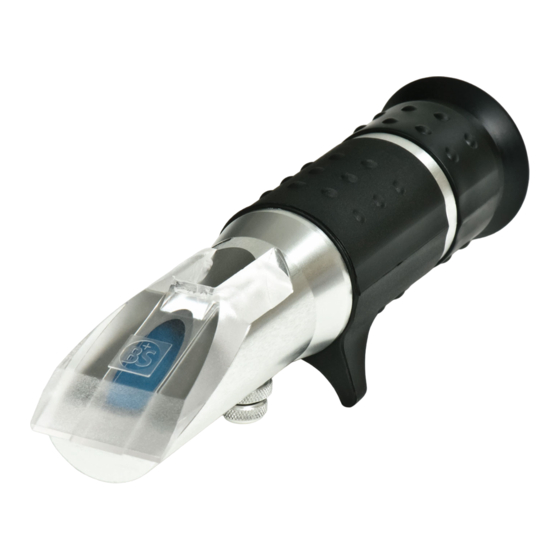
Advertisement
BELLINGHAM + STANLEY WINE REFRACTOMETER
The refractive index and the specific gravity of wines and ciders are affected by both the
alcohol and the residual sucrose that it contains, in such a way that if the 'units' of the S.G.
reading are subtracted from the refractive index measured on a suitable scale, the
difference (R minus D) is directly related to the alcoholic content, which can be read off from
a table.
Only a few drops of wine are needed to make the refractometer reading, while the S.G. is
measured in the usual way (most serious wine makers possess a hydrometer). The process
takes only a few minutes to carry out, and an accuracy of about 0.5% alcohol can be
obtained using reasonable care in ensuring that both readings are made at the same
temperature.
If the instrument is used with care, and cleaned as recommended after use, it should give
many years of accurate and trouble free service.
Equipment required:
Wine refractometer (Eclipse or OPTi models)
Hydrometer or Saccharometer
Hydrometer jar
Pipette or other suitable applicator
Siphon off enough of the finished wine to fill the hydrometer jar to required level, and leave
all the equipment with it in a place free from draughts and direct sunlight for at least an hour
to attain room temperature.
Measure the S.G. as accurately as possible and record.
Ensure that the refractometer prism is clean and then place one or two large drops of wine
on the instrument using a suitable applicator. Take a measurement of the 'R' reading and
record either visually using an Eclipse refractometer or automatically using an OPTi
refractometer.
The ABV can then be calculated using the formula below or by using our ABV Calculator
located on our website at
S:\mkting\brochure\instruct\wineinst.doc
HOW IT WORKS
USING THE WINE REFRACTOMETER
www.bellinghamandstanley.com/mobile
Advertisement
Table of Contents

Summary of Contents for Bellingham and Stanley Eclipse
- Page 1 Ensure that the refractometer prism is clean and then place one or two large drops of wine on the instrument using a suitable applicator. Take a measurement of the ‘R’ reading and record either visually using an Eclipse refractometer or automatically using an OPTi refractometer.
- Page 2 · The zero of the refractometer can be checked at any time by using distilled water at 20°C. When the R reading should be 15 within ½ a scale division (Eclipse model only). · Always clean the plastic illuminator plate when cleaning the prism (Eclipse model only).
- Page 3 ALCOHOL CONTENT TABLE R - D ° Proof R - D ° Proof R - D ° Proof 40.0 16.3 55.0 25.9 14.8 70.0 35.5 20.3 40.5 16.6 55.5 26.2 14.9 70.5 35.8 20.4 41.0 16.9 56.0 26.5 15.1 71.0 36.1 20.6 41.5...


Need help?
Do you have a question about the Eclipse and is the answer not in the manual?
Questions and answers